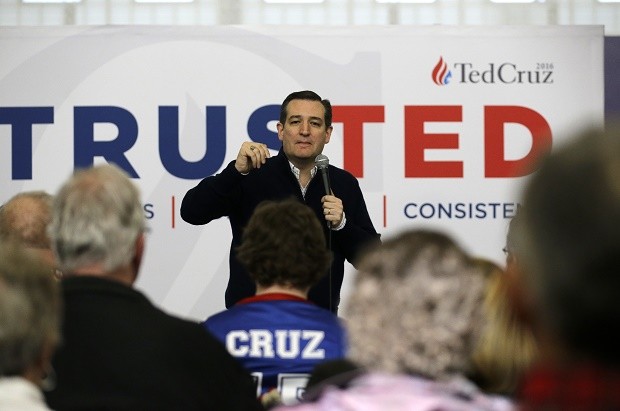Cruz defeats Trump in Iowa; Clinton, Sanders in tight race

Republican presidential candidate, Sen. Ted Cruz, R-Texas, speaks to supporters at Green County Community Center, Monday, Feb. 1, 2016, in Jefferson, Iowa. AP
DES MOINES, Iowa — Ted Cruz, a fiery, conservative Texas senator loathed by his own party’s leaders, swept to victory in Iowa’s Republican caucuses Monday, overcoming billionaire Donald Trump and Florida Sen. Marco Rubio. Among Democrats, Hillary Clinton and Bernie Sanders were deadlocked in a tight race.
Cruz’s victory was a harsh blow to Trump, the supremely confident real estate mogul who has roiled the Republican field for months with controversial statements about women and minorities.
READ: Ted Cruz wins Iowa Republican caucus
The victory in the first Republican nominating contest ensures that Cruz will be a force in the presidential race for weeks to come — if not longer. The first-term Texas senator now heads to next week’s New Hampshire primary as an undisputed favorite of the furthest right voters, a position of strength for drawing in evangelical voters and others who prioritize an abrupt break with President Barack Obama’s policies.
Perhaps most importantly, Cruz’s win denied Trump a huge opportunity to gain momentum heading into New Hampshire. Trump parlayed his fame as a real estate mogul and reality television star into large rallies and national poll numbers that before Monday night had established him as the Republican front-runner.
The Iowa caucuses kicked off voting in the 2016 presidential race, a tumultuous contest with unexpected candidates challenging both the Republican and Democratic establishments.
Candidates faced an electorate deeply frustrated with Washington. While the economy has improved under Obama, the recovery has eluded many Americans. New terror threats at home and abroad have increased national security concerns
Clinton, the former secretary of state, US senator and first lady, had been expected to cruise to victory in Iowa and beyond. But Sanders has appealed to the Democrats’ liberal base, especially the young, who are concerned about growing income inequality and the shrinking of the middle class.
READ: Clinton, Trump face first test as Iowa kicks off US voting
Vote counts at the 90 percent point in tabulations showed Clinton and Sanders in a virtual tie.
Iowa has long led off the state-by-state contests to choose delegates for the parties’ national conventions. Historically, a victory has hardly assured the nomination — Iowa accounts for only about 1 percent of the delegates who select the nominee. But a win there, or even an unexpectedly strong showing, can give a candidate momentum and media attention, while a poor showing can end a candidacy.
Monday’s contest offered the first test of whether Trump, a reality TV star, could turn the legion of fans drawn to his plainspoken populism into voters. But he faced a tough rival in Cruz, whose uncompromising and sometimes abrasive anti-Washington approach has antagonized establishment Republicans, but excited conservatives who see politicians as unprincipled and ineffective.
In the state’s Democratic contest, the tight race revived memories of Clinton’s disappointing showing eight years ago when Obama won the caucuses and, ultimately, the Democratic nomination and presidency.
Clinton has campaigned as a progressive who could get things done in a Washington split by an intense partisan divide. But her familiar name and long resume aren’t necessarily advantages in an election year dominated by anti-establishment candidates. Clinton has also been on the defensive over her use of a personal email account for official business as secretary of state, raising questions about whether she mishandled government secrets and her overall trustworthiness.
The caucuses marked the end of at least two candidates’ White House hopes. Former Maryland Gov. Martin O’Malley ended his longshot bid for the Democratic nomination and former Arkansas Gov. Mike Huckabee dropped out of the Republican race.
Iowa is a contest of organization as well as popularity. With votes being cast in about 2,000 meetings across the state, candidates not only had to win over voters, but make sure their supporters turned up — a much more difficult task than generating turnout for all-day primary voting.
“We knocked on 125,000 doors this past weekend,” Clinton told NBC’s “Today” show. “Although it’s a tight race, a lot of the people who are committed to caucusing for me will be there and standing up for me and I will do the same for them in the campaign and in the presidency.”
Sanders told volunteers and supporters: “We will struggle tonight if the voter turnout is low. That’s a fact.'”
A victory by Sanders in Iowa would give him momentum headed into the Feb. 9 New Hampshire primary. Sanders is expected to do well in New Hampshire, which is next to his home state of Vermont. But his long-term prospects remain questionable. Clinton has a lead in national polls and is well-placed to win other states over the next month, especially those which unlike Iowa have large numbers of black and Latino voters.
Some of the Republican candidates have been focusing more on New Hampshire than Iowa, including Bush, Ohio Gov. John Kasich and New Jersey Gov Chris Christie. While none is expected to do well in Iowa, they are all hoping for strong showings in New Hampshire to keep their campaigns alive.














